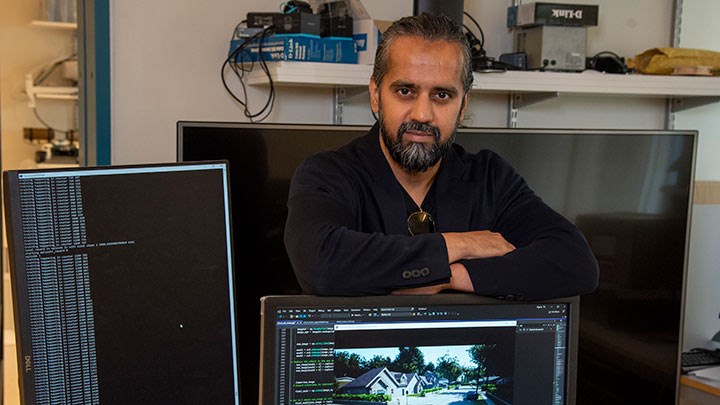Human needs to guide AI – new research network formed in Örebro

“The artificial intelligence that determines how cars perceive their environment must be developed to become safer and more adapted to humans, especially to older people and children,” says Mehul Bhatt, professor of computer science.
Human needs should guide the development of artificial intelligence, AI. This is the basis for a new international network of researchers and businesses that recently held their network launch meeting in Örebro.
“Our goal is to develop forms of AI that work side by side with humans and adapt to human needs and preferences,” says Mehul Bhatt, professor of computer science at Örebro University.
Örebro University, Chalmers University of Technology in Gothenburg and KTH Royal Institute of Technology in Stockholm collaborate in the “Network on Human-Centered Collaborative Autonomy” to gather research colleagues from, among others, Japan, USA and several European countries – as well as various business partners, such as AB Volvo and ABB Group.
“The network started with an idea workshop on what new directions for research are now needed. We have also taken initiatives for concrete projects, research conferences and specially designed courses and study programmes,” says Mehul Bhatt.
AI and human cognition
As a researcher, Mehul Bhatt combines AI technology research, with research on human cognition, that is, the human ability to receive, store, process and use information. The knowledge about humans is used to develop AI and improve technology. Self-driving cars and industrial robots are a priority area for the new network.
“The artificial intelligence that determines how cars perceive their environment must be developed to become safer and more adapted to humans, especially to older people and children,” says Mehul Bhatt.
Next-generation factories are another area. The purpose of the network is to initiate research and development that will lead to robots taking over more of dangerous or strenuous tasks.
More robust and reliable
For Karinne Ramirez-Amaro, researcher at Chalmers University of Technology, one of the goals of the network is to enable safe and trustworthy hybrid decision-making approaches that will enable more robust and reliable collaborations between industrial robots and humans.
“Robots’ ability to perceive and use more of all the small signals and codes that humans use when interacting with each other must also improve. That way, the robots can function better together with humans,” says Mehul Bhatt.
The next step for the members of the network is, among other things, to prepare applications for research funding in collaboration with industry, and to arrange workshops targeting the wider international research community.
Text: Maria Elisson
Translation: Charlotta Hambre-Knight
Photo: Jesper Mattsson
Members of the network have now had their first meeting in Örebro. Participants included coordinators Mehul Bhatt, Örebro University, Karinne Ramirez-Amaro and Emmanuel Dean, Chalmers University of Technology in Gothenburg, and André Pereira, KTH Royal Institute of Technology in Stockholm. Others taking part in the meeting were Clayton Lewis, University of Colorado at Boulder, Maithilee Kunda, Vanderbilt University, Tom Ziemke, Linköping University, Jakob Suchan, Constructor University and representatives from AB Volvo and ABB Group.
At the initial stage, the network receives funding from Chalmers AI Research Center (CHAIR), EU (COST Action Multi3Generation) and the Swedish Research Council.
